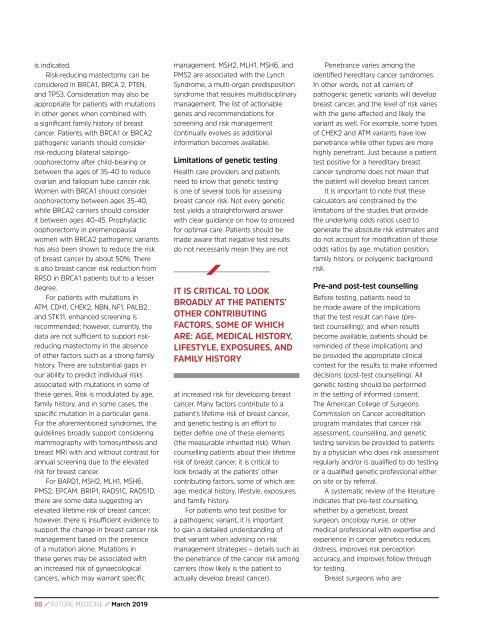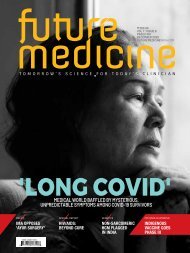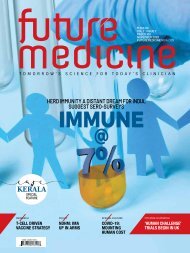March 2019 digital v1
Create successful ePaper yourself
Turn your PDF publications into a flip-book with our unique Google optimized e-Paper software.
is indicated.<br />
Risk-reducing mastectomy can be<br />
considered in BRCA1, BRCA 2, PTEN,<br />
and TP53. Consideration may also be<br />
appropriate for patients with mutations<br />
in other genes when combined with<br />
a significant family history of breast<br />
cancer. Patients with BRCA1 or BRCA2<br />
pathogenic variants should consider<br />
risk-reducing bilateral salpingooophorectomy<br />
after child-bearing or<br />
between the ages of 35-40 to reduce<br />
ovarian and fallopian tube cancer risk.<br />
Women with BRCA1 should consider<br />
oophorectomy between ages 35-40,<br />
while BRCA2 carriers should consider<br />
it between ages 40-45. Prophylactic<br />
oophorectomy in premenopausal<br />
women with BRCA2 pathogenic variants<br />
has also been shown to reduce the risk<br />
of breast cancer by about 50%. There<br />
is also breast cancer risk reduction from<br />
RRSO in BRCA1 patients but to a lesser<br />
degree.<br />
For patients with mutations in<br />
ATM, CDH1, CHEK2, NBN, NF1, PALB2,<br />
and STK11, enhanced screening is<br />
recommended; however, currently, the<br />
data are not sufficient to support riskreducing<br />
mastectomy in the absence<br />
of other factors such as a strong family<br />
history. There are substantial gaps in<br />
our ability to predict individual risks<br />
associated with mutations in some of<br />
these genes. Risk is modulated by age,<br />
family history, and in some cases, the<br />
specific mutation in a particular gene.<br />
For the aforementioned syndromes, the<br />
guidelines broadly support considering<br />
mammography with tomosynthesis and<br />
breast MRI with and without contrast for<br />
annual screening due to the elevated<br />
risk for breast cancer.<br />
For BARD1, MSH2, MLH1, MSH6,<br />
PMS2, EPCAM, BRIP1, RAD51C, RAD51D,<br />
there are some data suggesting an<br />
elevated lifetime risk of breast cancer;<br />
however, there is insufficient evidence to<br />
support the change in breast cancer risk<br />
management based on the presence<br />
of a mutation alone. Mutations in<br />
these genes may be associated with<br />
an increased risk of gynaecological<br />
cancers, which may warrant specific<br />
management. MSH2, MLH1, MSH6, and<br />
PMS2 are associated with the Lynch<br />
Syndrome, a multi-organ predisposition<br />
syndrome that requires multidisciplinary<br />
management. The list of actionable<br />
genes and recommendations for<br />
screening and risk management<br />
continually evolves as additional<br />
information becomes available.<br />
Limitations of genetic testing<br />
Health care providers and patients<br />
need to know that genetic testing<br />
is one of several tools for assessing<br />
breast cancer risk. Not every genetic<br />
test yields a straightforward answer<br />
with clear guidance on how to proceed<br />
for optimal care. Patients should be<br />
made aware that negative test results<br />
do not necessarily mean they are not<br />
IT IS CRITICAL TO LOOK<br />
BROADLY AT THE PATIENTS’<br />
OTHER CONTRIBUTING<br />
FACTORS, SOME OF WHICH<br />
ARE: AGE, MEDICAL HISTORY,<br />
LIFESTYLE, EXPOSURES, AND<br />
FAMILY HISTORY<br />
at increased risk for developing breast<br />
cancer. Many factors contribute to a<br />
patient’s lifetime risk of breast cancer,<br />
and genetic testing is an effort to<br />
better define one of these elements<br />
(the measurable inherited risk). When<br />
counselling patients about their lifetime<br />
risk of breast cancer, it is critical to<br />
look broadly at the patients’ other<br />
contributing factors, some of which are:<br />
age, medical history, lifestyle, exposures,<br />
and family history.<br />
For patients who test positive for<br />
a pathogenic variant, it is important<br />
to gain a detailed understanding of<br />
that variant when advising on risk<br />
management strategies – details such as<br />
the penetrance of the cancer risk among<br />
carriers (how likely is the patient to<br />
actually develop breast cancer).<br />
Penetrance varies among the<br />
identified hereditary cancer syndromes.<br />
In other words, not all carriers of<br />
pathogenic genetic variants will develop<br />
breast cancer, and the level of risk varies<br />
with the gene affected and likely the<br />
variant as well. For example, some types<br />
of CHEK2 and ATM variants have low<br />
penetrance while other types are more<br />
highly penetrant. Just because a patient<br />
test positive for a hereditary breast<br />
cancer syndrome does not mean that<br />
the patient will develop breast cancer.<br />
It is important to note that these<br />
calculators are constrained by the<br />
limitations of the studies that provide<br />
the underlying odds ratios used to<br />
generate the absolute risk estimates and<br />
do not account for modification of those<br />
odds ratios by age, mutation position,<br />
family history, or polygenic background<br />
risk.<br />
Pre-and post-test counselling<br />
Before testing, patients need to<br />
be made aware of the implications<br />
that the test result can have (pretest<br />
counselling); and when results<br />
become available, patients should be<br />
reminded of these implications and<br />
be provided the appropriate clinical<br />
context for the results to make informed<br />
decisions (post-test counselling). All<br />
genetic testing should be performed<br />
in the setting of informed consent.<br />
The American College of Surgeons<br />
Commission on Cancer accreditation<br />
program mandates that cancer risk<br />
assessment, counselling, and genetic<br />
testing services be provided to patients<br />
by a physician who does risk assessment<br />
regularly and/or is qualified to do testing<br />
or a qualified genetic professional either<br />
on site or by referral.<br />
A systematic review of the literature<br />
indicates that pre-test counselling,<br />
whether by a geneticist, breast<br />
surgeon, oncology nurse, or other<br />
medical professional with expertise and<br />
experience in cancer genetics reduces<br />
distress, improves risk perception<br />
accuracy, and improves follow through<br />
for testing.<br />
Breast surgeons who are<br />
88 / FUTURE MEDICINE / <strong>March</strong> <strong>2019</strong>


















